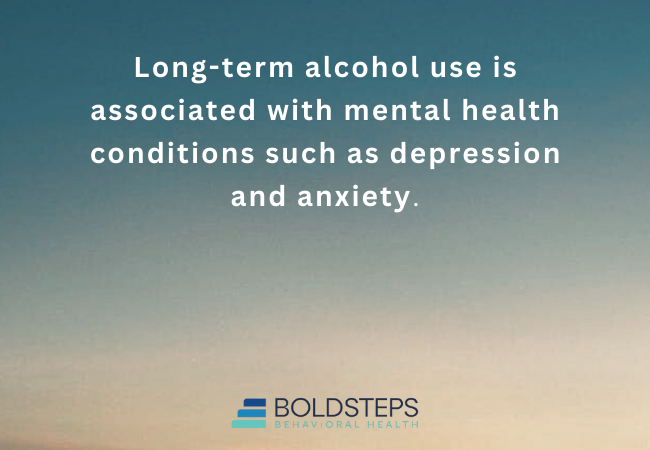Alcohol is one of the most commonly used substances worldwide. While moderate drinking may not pose immediate harm, long-term alcohol consumption can lead to serious health complications affecting both the body and mind. Excessive alcohol use is linked to liver disease, heart conditions, mental health disorders, weakened immunity, and increased risk of cancer, among other chronic health concerns.
Many people may not realize the gradual and cumulative damage that alcohol inflicts over time. For individuals struggling with alcohol addiction, seeking professional treatment is crucial to prevent permanent health damage and regain control of their well-being.
At Bold Steps Behavioral Health in New Hampshire, we offer a comprehensive Alcohol Addiction Treatment Program designed to help individuals recover from alcohol dependence and rebuild their lives. This guide will explore the long-term effects of alcohol on physical and mental health, the warning signs of alcohol use disorder (AUD), and the treatment options available to support lasting recovery.
The Long-Term Physical Effects of Alcohol
Alcohol affects nearly every organ in the body, and excessive drinking over time can lead to chronic diseases and permanent damage.
1. Liver Damage and Disease
The liver is responsible for breaking down alcohol, but prolonged alcohol use can cause:
- Fatty Liver Disease – An early stage of liver damage, causing fat accumulation in liver cells.
- Alcoholic Hepatitis – Inflammation of the liver that can lead to fever, jaundice, and pain.
- Cirrhosis – Severe scarring of the liver, which can lead to liver failure or death.
Statistics:
- Between 10-20% of heavy drinkers develop cirrhosis. (National Institute on Alcohol Abuse and Alcoholism, NIAAA)
- Liver disease from alcohol accounts for 44% of all liver-related deaths in the U.S. (Centers for Disease Control and Prevention, CDC)
2. Cardiovascular Complications
Chronic alcohol use weakens the heart and vascular system, leading to:
- High Blood Pressure – Increasing the risk of stroke and heart attack.
- Cardiomyopathy – A condition that enlarges and weakens the heart muscle.
- Arrhythmias – Irregular heartbeats that can lead to sudden cardiac arrest.
3. Damage to the Digestive System
Alcohol irritates and inflames the digestive tract, which can cause:
- Gastritis – Chronic stomach inflammation leading to ulcers and digestive discomfort.
- Pancreatitis – Inflammation of the pancreas, which can be life-threatening.
- Malabsorption of Nutrients – Long-term alcohol use leads to vitamin deficiencies, including Vitamin B1 (thiamine), which is essential for brain function.
4. Increased Cancer Risk
Alcohol is classified as a Group 1 carcinogen by the World Health Organization (WHO), meaning it directly contributes to cancer development. Long-term alcohol use significantly increases the risk of the following cancers:
- Liver Cancer
- Breast Cancer
- Throat and Esophageal Cancer
- Colorectal Cancer
Statistics:
- Alcohol-related cancers account for 5.5% of all cancer deaths globally. (American Cancer Society, 2023)
- Women who consume more than three alcoholic drinks per day have a 30% higher risk of breast cancer. (National Cancer Institute, NCI)
5. Immune System Suppression
Chronic alcohol use weakens the immune system, making individuals more susceptible to:
- Pneumonia and respiratory infections
- Tuberculosis
- Slower wound healing and greater susceptibility to infections
The Long-Term Mental Health Effects of Alcohol
Alcohol doesn’t just impact physical health—it also takes a severe toll on mental well-being. Chronic alcohol use alters brain chemistry and function, increasing the risk of mental health disorders.
1. Depression and Anxiety Disorders
Alcohol disrupts the balance of neurotransmitters such as serotonin and dopamine, leading to:
- Chronic depression – Heavy drinkers are twice as likely to develop major depressive disorder.
- Increased anxiety and panic attacks – Alcohol can create temporary relaxation, but over time, it worsens anxiety symptoms.
- Increased suicidal thoughts and behavior – Alcohol use is linked to 60% of suicide attempts in the U.S. (NIAAA, 2023)
2. Alcohol-Induced Psychosis and Hallucinations
Long-term alcohol abuse can cause alcohol-related psychotic disorders, which include:
- Hallucinations – Seeing or hearing things that aren’t there.
- Delusions – False beliefs about reality.
- Paranoia and confusion – Making it difficult to function in daily life.
3. Cognitive Decline and Memory Impairment
Alcohol damages the brain’s ability to process, store, and recall information, leading to:
- Memory loss and blackouts – Short-term memory impairment that worsens with prolonged drinking.
- Alcohol-Related Dementia – Chronic alcohol use can cause severe cognitive decline.
- Wernicke-Korsakoff Syndrome (Wet Brain) – A severe memory disorder caused by Vitamin B1 (thiamine) deficiency.
Statistics:
- Heavy alcohol consumption increases the risk of dementia by threefold. (Alzheimer’s Research & Therapy Journal, 2023)
- 1 in 8 chronic alcohol users develop Wernicke-Korsakoff Syndrome. (NIAAA, 2022)
How Alcohol Affects Social and Emotional Well-Being
Beyond physical and mental health, alcohol impacts relationships, careers, and overall quality of life.
1. Strained Relationships and Family Conflicts
Alcohol abuse damages relationships due to:
- Increased aggression, irritability, and emotional instability.
- Broken trust and dishonesty regarding alcohol use.
- Neglect of responsibilities at home, work, or school.
2. Work and Financial Consequences
- Increased absenteeism and job loss due to alcohol-related issues.
- Legal consequences such as DUIs and arrests.
- Financial strain from excessive spending on alcohol and healthcare costs.
3. Isolation and Social Withdrawal
Alcohol addiction often leads to social withdrawal, making it difficult to maintain friendships and support networks.
Seeking Help: Alcohol Addiction Treatment Options in New Hampshire
For those struggling with alcohol addiction, professional treatment is essential. Bold Steps Behavioral Health offers a variety of treatment programs tailored to individual needs.
1. Medical Detox Program
- Safely manages withdrawal symptoms with medical supervision.
- Prevents complications such as seizures and delirium tremens (DTs).
2. Partial Hospitalization Program (PHP)
- Structured full-day treatment while allowing patients to return home at night.
- Combination of medical support, therapy, and recovery planning.
3. Intensive Outpatient Program (IOP)
- Flexible therapy schedules for those balancing work or family.
- Continued support after completing PHP or detox.
4. Outpatient Treatment & Virtual Therapy
- Long-term therapy and relapse prevention tools.
- Virtual sessions available for convenience.
Conclusion
The long-term effects of alcohol on both mental and physical health can be devastating, but it’s never too late to seek help. Whether it’s liver disease, heart complications, cognitive decline, or emotional struggles, the damage from alcohol can progress silently over time. However, with professional treatment, support, and a commitment to change, recovery is possible.
At Bold Steps Behavioral Health in New Hampshire, we understand that overcoming alcohol addiction is not just about quitting drinking—it’s about rebuilding your health, relationships, and overall well-being. Our Alcohol Addiction Treatment Program offers comprehensive support, including medical detox, therapy, relapse prevention, and long-term recovery planning to help you regain control of your life. Call (603) 915-4223 to learn more about our Alcohol Addiction Treatment Program in New Hampshire.
FAQ on Effects of Alcohol on Mental &Physical Health
What are the most common long-term physical effects of alcohol?
Long-term alcohol use can cause serious health problems, including:
- Liver disease (fatty liver, alcoholic hepatitis, cirrhosis)
- Heart disease and high blood pressure
- Increased cancer risk (liver, breast, esophageal, colon cancer)
- Gastrointestinal issues (ulcers, pancreatitis)
- Weakened immune system
How does alcohol affect mental health over time?
Alcohol can disrupt brain chemistry, leading to:
- Chronic depression and anxiety
- Memory loss and cognitive decline
- Increased risk of dementia and Wernicke-Korsakoff Syndrome (Wet Brain)
- Alcohol-induced psychosis and hallucinations
What is Alcohol-Related Brain Damage (ARBD)?
ARBD is a condition caused by long-term alcohol abuse, leading to:
- Memory problems and confusion
- Difficulties in decision-making and problem-solving
- Impaired motor function and coordination
Can the damage caused by alcohol be reversed?
Some health effects can improve with early intervention and sobriety, including:
- Liver function (if cirrhosis has not developed)
- Brain function and memory (with proper nutrition and recovery)
- Heart health (reducing blood pressure and inflammation)
However, some conditions may be irreversible, such as severe liver cirrhosis or permanent brain damage. Seeking treatment early increases the chances of recovery.
How do I know if I have Alcohol Use Disorder (AUD)?
Signs of alcohol addiction include:
- Drinking more than intended or struggling to cut down
- Experiencing withdrawal symptoms like tremors, nausea, or anxiety
- Neglecting responsibilities due to drinking
- Drinking despite negative health or social consequences
If these symptoms sound familiar, seeking help from an Alcohol Addiction Treatment Program in New Hampshire can provide the support needed for recovery.
Does alcohol increase the risk of cancer?
Yes, alcohol is a known carcinogen, and long-term drinking increases the risk of developing:
- Liver cancer
- Breast cancer (even with moderate drinking)
- Esophageal and throat cancer
- Colon cancer



